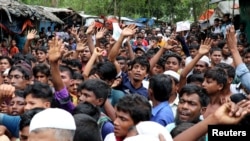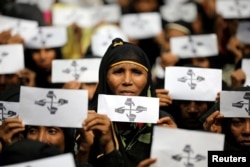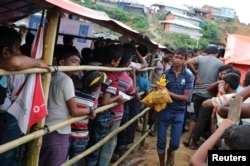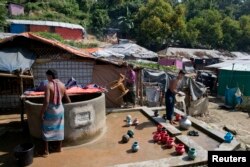U.N. aid agencies are seeking $920 million to provide lifesaving aid for more than 900,000 Rohingya refugees who fled violence and persecution in Myanmar and crossed into Bangladesh.
The money also will be used to assist more than 330,000 vulnerable Bangladeshis hosting them near the border in the Cox's Bazar region.
Most Rohingya refugees are living in cramped, squalid conditions in Kutupalong, the largest refugee camp in the world. Bangladeshi authorities have been praised for their generosity in hosting the large refugee population. But Bangladesh's state minister of foreign affairs, Shahriar Alam, has acknowledged the difficulties involved.
Repatriation is objective
Alam said the key to resolving the problem is repatriation, and that Bangladesh has been exploring this option with U.N. agencies. Last year, the U.N. and the government of Myanmar signed a memorandum of understanding regarding the repatriation of Rohingya refugees.
"But unfortunately, the situation in Myanmar is still not conducive for a voluntary, safe and dignified return," Alam said. "So, we are urging the international community to put pressure on Myanmar and engage with them constructively so, as a responsible and responsive member of the United Nations, they take their citizens back without further delays."
In the meantime, he said, action must be taken to support and protect the refugees. Alam said his government had spent about $250 million to get one of the nearby islands ready to relocate and shelter up to 100,000 Rohingya.
"Because the place where they are staying is vulnerable to heavy rain and cyclones," he said. "This is one of the biggest worries that we had from 2018." He said the monsoon and cyclone season was approaching, and he hoped the preparations made so far "will be enough for this year for a safe stay of the Rohingya people."
The U.N. high commissioner for refugees, Filippo Grandi, said that in the coming weeks, work must be accelerated to protect the Rohingya from the ravages of the next monsoon season.
Grandi said he was optimistic that the money to fund the operation would be forthcoming. He added that several countries attending a donor conference had pledged $132 million and that several other major donors said they would announce pledges in the coming weeks.
"So, I think this figure will quickly rise," Grandi said. "And I think for this type of exercise, having a result immediately like that is not bad. It is a sign, I hope, of continued support for a situation that unfortunately gets protracted."
The U.N. said more than half of the funding would go for food, water, sanitation and shelter. Other key sectors of the appeal include health, site management, and protection for children and survivors of sexual and gender-based violence.
The director general of the International Organization for Migration, Antonio Vitorino, said addressing the critical needs of the Rohingya refugees was the biggest challenge. At the same time, he said, the impact of the refugees on the host communities in Bangladesh must be addressed.
"The two things go together … that at the same time we address the needs of those who are displaced, we minimize the impacts that the massive displacement of people has in the host communities," Vitorino said.
Competition for resources and jobs has raised tensions between the Rohingya and host communities.
Mahadi Muhammad is divisional director for the group Action Against Hunger on behalf of the organization NGO Platform of Social Action, a consortium of 104 nongovernmental organizations that work in Cox's Bazar. Muhammad told VOA that the platform has some social cohesion programs aimed at easing conflicts between the Rohingya and local residents.
Focus on who is vulnerable
"Most of the programs we have not only for the Rohingya community, but also for the Bangladeshi community who are affected due to this Rohingya crisis," Muhammad said. "Whenever we go for any kinds of program implementation, we focus on the vulnerability, not the ethnicity, whether it is the Rohingya or the Bangladeshi. We always focus on the vulnerability."
U.N. agencies have succeeded in lessening environmental degradation, reducing the prevalence of acute malnutrition, increasing child immunizations and securing other benefits.
They note the situation of the Rohingya remains precarious. Until the root causes of displacement in Myanmar are addressed and the refugees can go home, they say, international support will remain crucial.







